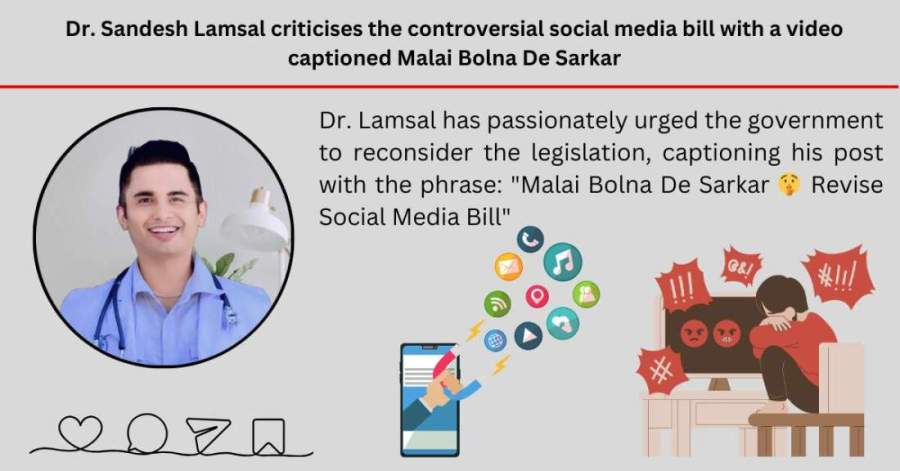

Dr. Sandesh Lamsal, a prominent Nepali social media influencer, doctor, and social activist, has publicly denounced the proposed Social Media Bill. Dr. Lamsal showed his dissatisfaction by publishing a video of himself speaking on a mic with background music comprising a fragment from the Mayor of Kathmandu Metropolitan City and rapper Balen’s five-year-old song “Balidan” on platforms such as Facebook, X (formerly Twitter), vt.tiktok.com/ZSMRJohQJ Dr. Lamsal has passionately urged the government to reconsider the legislation, captioning his post with the phrase: “Malai Bolna De Sarkar 🤫 Revise Social Media Bill”.
This has sparked a wave of online dissent, with the hashtags #BolnaDeSarkar and #ReviseSocialMediaBill on social media platforms and is currently gaining mainstream media coverage across the country. Many Nepalis have supported the movement, believing that the bill threatens their fundamental right to freedom of speech. Among those showing solidarity is Kathmandu Metropolitan City Mayor Balen Shah, who shared a snippet from his five-year-old song “Balidan” (Sacrifice) to express his opposition creatively.
The Origins of the Social Media Bill
On January 28, the Nepali government formally introduced the “Bill on the Operation, Use, and Regulation of Social Media” in the National Assembly. The proposed legislation seeks to create norms for social media use in Nepal. However, this has created a buzz among citizens and immediately become a source of intense controversy, drawing broad condemnation from a variety of sources, including the main opposition party, the CPN (Maoist Centre), journalist associations, and civil society organisations.
While the government claims that the bill is a necessary step towards regulating the digital space, critics and social activists argue that its provisions violate constitutional rights, particularly those guaranteed by Articles 17 and 19 of Nepal’s Constitution, which guarantee personal freedom and the right to communicate.
Key Provisions Stirring Controversy
The bill contains several clauses that many perceive as vague and open to misuse. One particularly contentious point is Subsection 16(2), which prohibits individuals from posting, sharing, liking, commenting, tagging, or using hashtags on social media with “malicious intent.” However, the bill fails to define what constitutes “malicious intent,” leaving room for arbitrary interpretations by authorities. Experts worry that this ambiguity could lead to the unjust censorship of voices or criticism of the government.
Another problematic section is Section 20(1), which prohibits the sharing of “confidential information.” While talking about this with Dr. Lamsal, he stated that this rule would stifle investigative journalism and healthcare awareness and prevent reporting on government inefficiency, corruption, or other irregularities.
Perhaps the most concerning part for the Nepali community is the necessity that social media users disclose personal information to the government. This condition is commonly regarded as an infringement of privacy rights, raising worries about the possible exploitation of sensitive information.
Penalties That Raise the Stakes
The bill includes severe consequences for individuals who violate its terms. Fines vary between Rs 500,000 and Rs 10 million, with repeat offenders facing double punishment under Section 28(2). These tough measures have been heavily criticised for being unreasonable and too punitive.
A Collective Pushback
The bill’s controversial nature has brought together a variety of opposing voices, including common citizens, human rights campaigners, journalists, and political figures. Many people believe that its implementation threatens free speech by preventing people from expressing opposition or engaging in serious debate online.
Dr. Lamsal’s video, in particular, has resonated with young Nepalis who see social media as an important platform for self-expression, advocacy, and action. His demand for the government to “Bolna De Sarkae “reflects a larger effort to defend democratic values in the face of potential overreach.
Adding to this movement, Mayor Balen Shah’s creative protest through music has amplified the message. His song “Balidan” reflects themes of sacrifice and resilience, resonating deeply with the ongoing fight to preserve freedom of expression in Nepal.
The Road Ahead
As public opposition to the Social Media Bill continues to grow, the government faces mounting pressure to revise its provisions. Activists like Dr. Lamsal, In Depth Story, The Nepali Comment, Why So Offended, Misguided Nepal, and Mayor Shah are at the forefront of this movement, using their platforms to amplify the voices of concerned citizens.
The campaign against the bill is more than just a call for legislative change—it is a fight to protect the principles of democracy, transparency, and accountability in Nepal. Whether the government will heed these calls and make meaningful revisions remains to be seen.
For now, the hashtag #BolnaDeSarkar serves as an advocation for freedom of expression, uniting Nepalis from all walks of life in a shared commitment to safeguarding their rights.
Comment